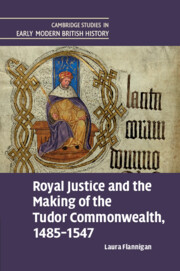Book contents
- Royal Justice and the Making of the Tudor Commonwealth, 1485–1547
- Cambridge Studies in Early Modern British History
- Royal Justice and the Making of the Tudor Commonwealth, 1485–1547
- Copyright page
- Dedication
- Contents
- Figures and Tables
- Acknowledgements
- Note on the Text
- Abbreviations
- Introduction
- Part I The New Justice System
- Part II Seeking and Requesting Justice
- Chapter 4 Geography and Demography
- Chapter 5 Disputes and Dispute Resolution
- Chapter 6 ‘Your Poor Orator’: Petitioning the King
- Part III Delivering and Contesting Justice
- Appendix Personnel in the Court of Requests, 1493–1547
- Bibliography
- Index
Chapter 4 - Geography and Demography
from Part II - Seeking and Requesting Justice
Published online by Cambridge University Press: 02 November 2023
- Royal Justice and the Making of the Tudor Commonwealth, 1485–1547
- Cambridge Studies in Early Modern British History
- Royal Justice and the Making of the Tudor Commonwealth, 1485–1547
- Copyright page
- Dedication
- Contents
- Figures and Tables
- Acknowledgements
- Note on the Text
- Abbreviations
- Introduction
- Part I The New Justice System
- Part II Seeking and Requesting Justice
- Chapter 4 Geography and Demography
- Chapter 5 Disputes and Dispute Resolution
- Chapter 6 ‘Your Poor Orator’: Petitioning the King
- Part III Delivering and Contesting Justice
- Appendix Personnel in the Court of Requests, 1493–1547
- Bibliography
- Index
Summary
Chapter 4 commences a survey of the Court of Requests’ litigants. Drawing data out of the entire Court archive, it charts the origins of cases and clients in counties across English-governed territories and the status identifiers ascribed to both petitioners and defendants. The demography of this Court is characterised by considerable geographical and social breadth; this was a truly ‘national’ tribunal, accessible to everyone from poor widows and humble craftsmen to civic officials and the landed classes. The chapter puts these findings into dialogue with the scholarship on the relative litigiousness of English regions and on wealth distribution in early modernity. Finally, the chapter tests the claim that Requests was the ‘poor man’s court’, asking whether we can identify truly impoverished individuals among the standard social categorisations appearing in court records. It argues that royal justice could serve litigants of more humble status, though this observation will be qualified in following chapters.
- Type
- Chapter
- Information
- Publisher: Cambridge University PressPrint publication year: 2023

